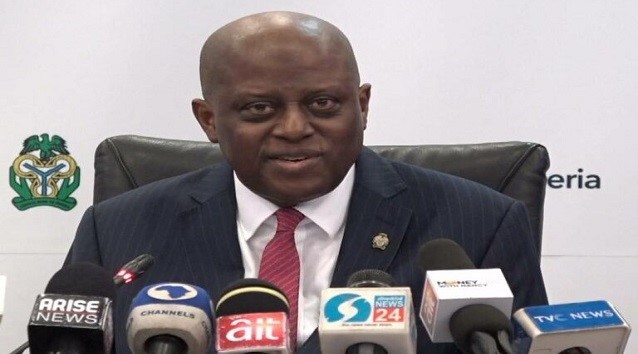E-Financial
Nigeria Makes U-Turn, Agrees to License Crypto Issuers

Securities and Exchange Commission (SEC) will grant licenses to virtual assets service providers such as cryptos this month, in a calculated move to capitalize on the exploding crypto market in the country while trying to keep a lid on the chaos.
This is happening at a time when the Nigerian currency, the naira, has lost 70% of its value against the dollar since June last year.
The Nigerian government has transitioned from earlier efforts to ban cryptocurrency to the current move to regulate it.
This comes after forceful measures such as the Central Bank of Nigeria (CBN) banning banks from dealing with cryptocurrencies.
But still, the adoption of cryptocurrencies continued, with Nigerians using other platforms such as Bitkoin Africa Inc. and Quidax after the government banned Binance.

The SEC’s decision to issue licenses is strategic as it seeks to tap into the potential of the crypto market while regulating it.
The agency wants to establish a legal basis for exchanging digital assets to avoid fraud and regulate the market.
The move comes amid a push to support the country’s tech-savvy youth, who have turned to cryptocurrencies as a way around the traditional banking system.
The SEC’s licensing initiative is part of a larger plan to encourage innovation while maintaining the appropriate level of regulation.
President Bola Ahmed Tinubu’s administration in Nigeria has been quite ambiguous in its approach towards Cryptocurrencies.
Although Tinubu’s campaign advocated for regulating cryptocurrencies and advancing blockchain technology, his government has also taken actions that have elicited concerns from the crypto industry.
Under the Finance Act, the government introduced a capital gains tax on profits from digital assets in 2023. Some viewed this as the bank getting closer to embracing cryptocurrencies, while others expressed concern over the effect on the unstable market.
Furthermore, the government has made rather paradoxical decisions: it has banned P2P trading while allowing banks to provide services for cryptocurrencies.
E-Financial
Report Suspected Illegal Investment Schemes to SEC

Securities and Exchange Commission (SEC) has urged Nigerians to report any suspected illegal investment schemes to the commission for proper investigation and necessary action.

This is in the light of the recent collapse of Crypto Bridge Exchange (CBEX).
The Commission issued a notice on Thursday to the investing public, warning that Ponzi investment schemes pose a significant danger to the growth of the capital market.
In its latest advisory, the Commission highlighted the growing threats and risks posed by Ponzi schemes, illegal investment operations, and unregistered digital asset platforms.
It explained that fraudulent entities and individuals continue to exploit unsuspecting investors with deceptive promises of high returns, often leveraging the allure of digital assets to create a false sense of legitimacy.
“The public is strongly advised to be wary of investment opportunities that promise guaranteed or unusually high returns with little or no risk.
“These include unregistered platforms offering cryptocurrency investments, forex trading, or blockchain-based schemes, without undergoing the prescribed processes to obtain prior approval from the SEC.
“The SEC reiterates in this regard that, ‘If it sounds too good to be true, it likely is.’”
The Commission urged potential investors to conduct thorough due diligence before investing and to verify the registration status of the company or individual offering the investment through the SEC’s website.
The Commission explained that Section 196(3) of the Investments and Securities Act, 2025, criminalizes the promotion and operation of prohibited or unregistered schemes.
“This violation is punishable, upon conviction, by a fine of not less than ₦20 million or a prison term of 10 years, or both,” the Commission warned.
The SEC stated that it is fully committed to identifying and prosecuting offenders to the full extent of the law.
“We encourage the public to partner with the SEC to safeguard the integrity of the investment environment in Nigeria by promptly reporting suspected illegal investment schemes to the SEC,” the notice concluded.
E-Financial
Fintechs Add $18m to New Tax Initiative

The Nigerian federal government announced that the Electronic Money Transfer Levy (EMTL) generated $49.5 million in revenue, with fintech companies contributing $18 million.

This fund, as reported by the Federation Account Allocation Committee, is a considerable 56.80 percent increase over the $31.6 million earned during the same period in 2024.
Previously, the charge mainly affected established banking institutions. However, fintech firms have been included because they have contributed a phenomenal 2,507.94 percent growth in transaction values since 2020.
The EMTL is part of the government’s attempt to regulate the booming fintech sector, which completed transactions worth $29 billion in 2023 and $49.3 billion in 2024.
The EMTL was created by the Finance Act 2020 as an amendment to the Stamp Duty Act. It charges $0.03 (N50) for electronic transactions of $6.19 (N10,000) or more made through banks and financial institutions.
This tax seeks to capitalise on the increasing expansion of electronic payments, which will exceed $619.70 billion in total transactions by 2024.
In response to the burgeoning fintech sector, the government has increased its tax base, with annual EMTL collections expected to increase by 31.35 percent.
According to the Medium Term Fiscal Framework for 2025-2027, the federal government expects EMTL revenue to reach $142 million in 2025, up from $108 million in 2024.
However, industry experts have expressed concern about the potential impact of additional taxes on users.
E-Financial
CBN Puts Accumulated Savings, Liquid Assets by Nigerians at N75.65trn

Amid mounting macroeconomic uncertainty, Nigerians are leaning heavily towards savings and low-risk financial instruments, with recent data from the Central Bank of Nigeria (CBN) showing a marked increase in quasi-money holdings.

Quasi-money are assets that are easily and quickly convertible into cash. They are considered to be close substitutes for cash in the economy.
According to the CBN’s Money and Credit Statistics for March 2025, quasi-money, comprising savings deposits, fixed-term deposits and other liquid but non-transactional assets, rose to N75.65 trillion, representing a 3.65 per cent month-on-month (m/m) increase and a 26.42 per cent rise year-on-year, up from N59.84 trillion in March 2024.
The surge highlights a growing preference for capital preservation, as households and businesses seek refuge in interest-bearing instruments amid Nigeria’s ongoing economic slowdown.
“The rising volume of quasi money reflects both a cautious approach to spending and increasing trust in formal financial institutions,” said a senior analyst at Vetiva Capital. “It’s a defensive strategy by savers who are navigating inflationary pressures and volatile market conditions.”
The CBN has maintained a tight monetary policy for over a year, with high interest rates designed to tame inflation. This stance has made fixed-income securities, such as treasury bills and term deposits, especially attractive to investors.
In January 2025, the CBN’s auction for 364-day treasury bills saw an oversubscription of N1.47 trillion, with stop rates reaching 22.6 per cent. By mid-February, total subscriptions across tenors remained strong at N2.41 trillion, underlining sustained demand for secure, high-yield instruments.
The data also reveals that broad money supply (M2) grew to N114.20 trillion in March 2025, a 23.69 per cent increase year-on-year, with quasi money continuing to dominate M2 composition. Meanwhile, demand deposits rose to N33.96 trillion, up 17.65 per cent from the same period last year, while currency outside banks jumped 26.72 per cent to N4.59 trillion.
The central bank also reported mixed trends in domestic credit: Net domestic credit rose 12.47 per cent year-on-year to N103.37 trillion, though it dipped 1.20 per cent month-on-month.
Credit to the government grew 31.99 per cent to N25.86 trillion year-on-year but fell 4.63 per cent in March, suggesting a brief pause in government borrowing whilst private sector credit growth remained modest at 7.10 per cent pointing to conservative lending practices and subdued appetite for new debt in the real economy.
Analysts say the quasi-money uptick reflects a broader trend of financial system deepening, driven by digitization and formal banking efforts. The rise in savings could, over time, translate into stronger capital pools for lending, once macroeconomic stability returns.
While the flight to safety is a rational response to uncertainty, experts warn that over-reliance on fixed-income assets could limit economic dynamism in the long term.
However, for now, Nigeria’s financial landscape suggests that stability, not speculation, is the dominant mood among savers and investors.

 Telecom2 days ago
Telecom2 days agoNigeria Hits 1 Terabit Internet Traffic Milestone

 E-Financial2 days ago
E-Financial2 days agoFCMB Capital Markets Leads ₦11.85bn GLNG Bond for LNG Plant Expansion

 General News2 days ago
General News2 days agoFG to Introduce New Tax Credit Scheme to Replace Pioneer Status Incentive

 Telecom2 days ago
Telecom2 days agoMTN Nigeria Faces Class Action Lawsuit over Alleged Data Mismanagement

 News2 days ago
News2 days agoIMF Downgrades Nigeria’s Economic Growth Forecast Amid Oil Price Decline

 E-Financial1 day ago
E-Financial1 day agoUnion Bank’s Edu360 Initiative Scores Big for Nigerian Football Development

 News2 days ago
News2 days agoNITDA Fixes Date for Inaugural Meeting of the Startup Consultative Forum

 Telecom2 days ago
Telecom2 days agoMart Networks Unveils Invinsense 6.0: AI-Powered Cybersecurity Revolution in Africa

























